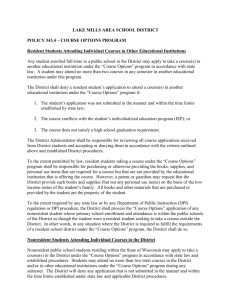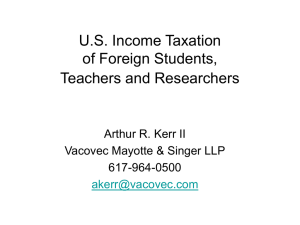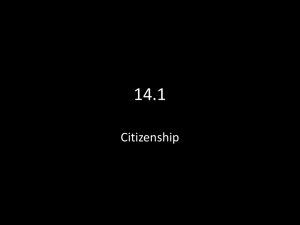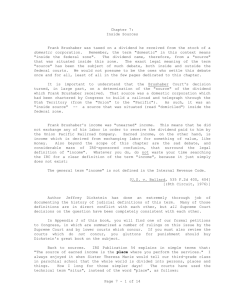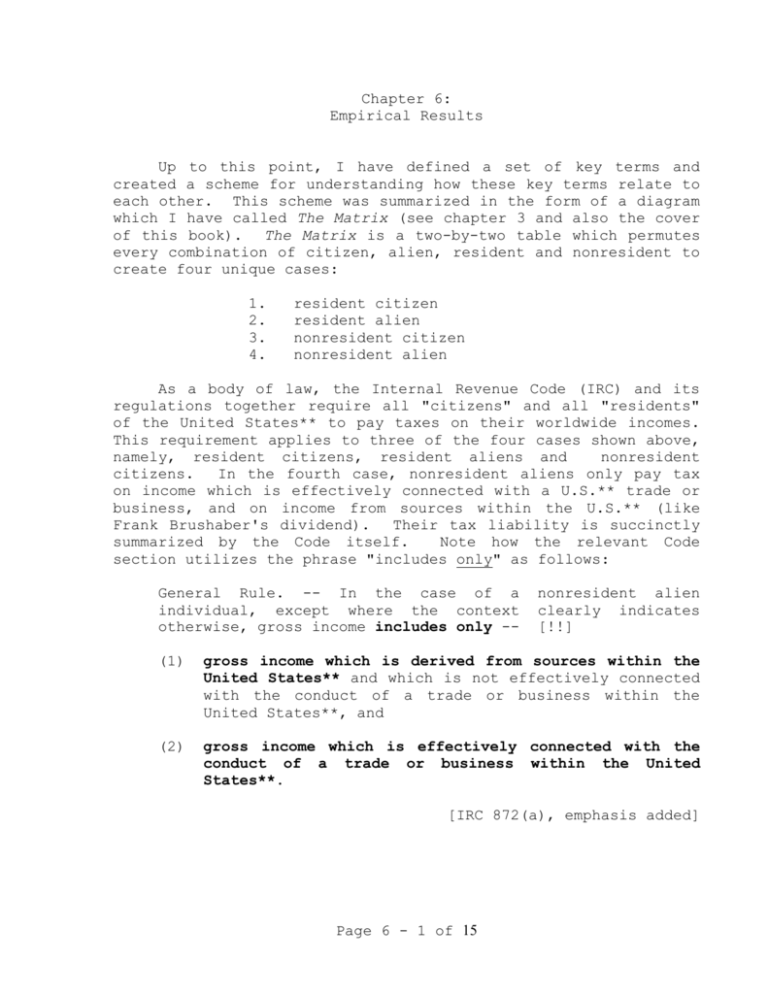
Chapter 6:
Empirical Results
Up to this point, I have defined a set of key terms and
created a scheme for understanding how these key terms relate to
each other. This scheme was summarized in the form of a diagram
which I have called The Matrix (see chapter 3 and also the cover
of this book). The Matrix is a two-by-two table which permutes
every combination of citizen, alien, resident and nonresident to
create four unique cases:
1.
2.
3.
4.
resident citizen
resident alien
nonresident citizen
nonresident alien
As a body of law, the Internal Revenue Code (IRC) and its
regulations together require all "citizens" and all "residents"
of the United States** to pay taxes on their worldwide incomes.
This requirement applies to three of the four cases shown above,
namely, resident citizens, resident aliens and
nonresident
citizens.
In the fourth case, nonresident aliens only pay tax
on income which is effectively connected with a U.S.** trade or
business, and on income from sources within the U.S.** (like
Frank Brushaber's dividend). Their tax liability is succinctly
summarized by the Code itself.
Note how the relevant Code
section utilizes the phrase "includes only" as follows:
General Rule. -- In the case of a
individual, except where the context
otherwise, gross income includes only --
nonresident alien
clearly indicates
[!!]
(1)
gross income which is derived from sources within the
United States** and which is not effectively connected
with the conduct of a trade or business within the
United States**, and
(2)
gross income which is effectively connected with the
conduct of a trade or business within the United
States**.
[IRC 872(a), emphasis added]
Page 6 - 1 of 15
The Federal Zone:
This may sound all well and good, in theory. How does it
work in practice? With so many words to document the recipe for
pudding, how does the pudding taste? Two case histories provide
the necessary proof.
Case 1
Figure 1 shows a letter which an American Citizen sent to
the District Director of the Internal Revenue Service in Ogden,
Utah.
This letter was prepared in response to an unsigned
letter from the IRS, requesting that he file a 1040 Form.
Figure 1:
Letter to District Director
December 5, 1990
District Director
Internal Revenue Service
Ogden, Utah 84201
Re:
NRA
SSN #___-__-____
On or about December 1, 1990, I received an unsigned
document claiming that you have not received the tax return
1040, and requesting that the form 1040 be filed.
I have
enclosed a copy of that request.
I know of no such code that
requires me to file a "tax return 1040". If you know of such a
code, please identify that code for me.
I have enclosed a copy of the letter that I have sent to
the Director of the Foreign Operations District, concerning this
matter.
In researching the revenue code book which your people
kindly supplied to me, I discovered that only an "individual" is
required to file a tax return (26 USC 6012) and then only under
certain circumstances. In looking at Section 7701(a)(1) of the
code, I discovered that the term "individual" is defined as a
"person". Then, in checking under 7701(a)(30), I discovered the
definition of a "United States person" as meaning a "citizen of
the United States", "resident of the United States", "domestic
corporation", "domestic partnership" and a "domestic trust or
estate".
There is no INDIVIDUAL defined under 7701(a)(30) and
therefore I cannot be an "individual" within the meaning of
7701(a)(1) and/or 26 USC 6012.
Page 6 - 2 of 15
Empirical Results
As well, the Supreme Court in the case of Wills vs Michigan
State Police, 105 L.Ed.2d 45 (1989) made it perfectly clear that
I, the sovereign, cannot be named in any statute as merely a
"person", or "any person".
I am a member of the "sovereignty"
as defined in Yick Wo vs Hopkins, 118 U.S. 356 and the Dred
Scott case, 60 U.S. 393.
Therefore and until you can prove otherwise, I am not a
"taxpayer", nor an "individual" that is required to file a tax
return.
Please forward to me a letter stating that I am not
liable for this tax return, or produce the documentation that
requires me to file the "requested" tax return.
If you have any questions concerning this letter, you may
write to me at the address shown below. Please sign all papers
so that I know who I am dealing with.
Until such a time as I
hear from you or your office, I will take the position that I am
no longer liable for filing the return. Failure to respond will
be taken as meaning that you have "acquiesced" and that, from
this date forward, the doctrine of "estoppel by acquiescence"
will prevail.
Sincerely,
/s/ NRA
Figure 1:
Letter to District Director
Note, in particular, his use of the key words "citizen of the
United States**", "resident of the United States**", "domestic
corporation", "domestic partnership", "domestic trust or estate"
and "sovereign". He asserted his status by explicitly claiming
to be a sovereign who was not the "person" defined at IRC
7701(a)(1), and who was not the "United States** person" defined
at 7701(a)(30). The IRC defines "person" as follows:
Person. -- The term "person" shall be construed to mean and
include an individual, a trust, estate, partnership,
association, company or corporation.
[IRC 7701(a)(1)]
Page 6 - 3 of 15
The Federal Zone:
The IRC defines "United States** person" as follows:
United States**
person" means -(A)
(B)
(C)
(D)
person.
--
The
term
"United
States**
a citizen or resident of the United States**,
a domestic partnership,
a domestic corporation, and
any estate or trust (other than a foreign estate or
foreign
trust,
within
the
meaning
of
Section
7701(a)(31)).
[IRC 7701(a)(30)]
Again, note the use of the key words "citizen", "resident",
"domestic", and "foreign" which have been highlighted for
emphasis.
These key words relate directly to The Matrix.
The
key words "domestic" and "foreign" relate directly to the
boundaries of the federal zone, that is, the "United States**"
as that term is defined in relevant sections of the United
States Codes (USC).
A domestic corporation is one which was
chartered inside the federal zone. A foreign estate or foreign
trust are foreign because they were established outside the
federal zone. Without making these statements in so many words,
our intrepid American's letter in Figure 1 can be used to draw
the following inferences about his status with respect to the
exclusive legislative jurisdiction of the "United States**":
1.
2.
3.
4.
5.
6.
7.
He
He
He
He
He
He
He
is
is
is
is
is
is
is
a sovereign as
not a citizen
not a resident
not a domestic
not a domestic
not a domestic
not a domestic
defined by the Supreme Court
of the United States**
of the United States**
corporation
partnership
estate and
trust
There is one important thing his letter did not state
explicitly about him, and that is his status as a nonresident
alien. Nevertheless, this inference can, in turn, be drawn from
two of the above inferences:
(2) he is not a citizen of the
United States** and
(3) he is not a resident of the United
States**.
As a human being, he is not an artificial "person"
like a corporation, partnership, estate, or trust. If he is not
a citizen of the United States**, then he is an alien. If he is
not a resident of the United States**, then he is a nonresident.
Therefore, he is a nonresident alien, according to the statute
and its regulations.
Page 6 - 4 of 15
Empirical Results
Now, let's take the pudding out of the oven and see how it
tastes.
After taking some time to review his letter, the IRS
addressed the following response to our intrepid American:
Department of the Treasury
Internal Revenue Service
Ogden, UT 84201
In reply refer to: 9999999999
June 27, 1991 LTR 2358C
___-__-____
8909 05 0000
Input Op: 9999999999
07150
To: NRA
Address
City, State Zip
Taxpayer Identification Number
Tax Form
Tax Period
Correspondence Received Date
:
:
:
:
___-__-____
1040
Sep. 30, 1989
June 13, 1991
Dear Taxpayer:
Based on our information, you are no longer liable for
filing this tax return.
We may contact you in the future
if issues arise that need clarification.
You do not need
to reply to this letter.
Sincerely yours,
/s/ J. M. Wood
Chief, Collection Branch
Case 2
It would have been interesting to see what kind of response
NRA would have received if he had stated explicitly his status
as a nonresident alien. Based on what we know already about the
law and its regulations, such an explicit statement might have
expedited the processing of his letter. But hindsight is always
20/20.
Fortunately, we do have another example where an
American Citizen did just that, in response to a similar IRS
request for a 1040 form. The following is the text of the IRS
request:
Page 6 - 5 of 15
The Federal Zone:
Department of the Treasury
Internal Revenue Service
Ogden, UT 94201
Date of this Notice: 08-19-91
Taxpayer Identification: (ssn)
Form:
1040
Tax Periods:
12-31-89
To: ARN
Your tax return is overdue -- Contact us immediately
We still have not received your tax return, Form 1040 U.S.
Individual Income Tax Return, for the year ending 12-31-89.
We must resolve this matter. Contact us immediately, or we
may take the following action:
1.
Summon you to come in with your books and records
as provided by Sections 7602 and 7603 of the
Internal Revenue Code;
2.
Criminal
prosecution
that
includes
a
fine,
imprisonment, or both, for persons who willfully
fail to file a tax return or provide tax
information (Code Section 7203).
To prevent these actions, file your tax return today and
attach your payment for any tax due. Even if you can't pay
the entire amount of tax you owe now, it is important that
you file your tax return today. Pay as much as you can and
tell us when you will pay the rest.
We may be able to
arrange for you to pay in installments. Detach and enclose
the form below with your return.
To expedite processing,
use the enclosed envelope.
If you are not required to file or have previously filed,
please contact us at the phone number shown above.
[unsigned]
I always enjoy it very much when the IRS states that "you
can pay in installments".
Somebody should write to them and
recommend that they consider augmenting their "Services" by
implementing a layaway plan. They may even have a special form
for this very thing:
Service Augmentation Request Form (RF)
Page 6 - 6 of 15
Empirical Results
#6666666, kind of like their "internal" Form 4685, as described
on page 34 of the IRS Printed Product Catalog, Document 7130:
Form 4685
41890S
(Each)
News Clipping Mounting Guide
This guide sheet is used for mounting news clippings
for submittal to the National Office.
C:PA:L Internal Use
Now, our second intrepid American, coded with the initials
ARN (Non Resident Alien abbreviated backwards) also took it upon
himself to respond in writing. This time, however, he wrote the
following words right on the IRS letter and sent it back to
them, certified mail, return receipt requested, on September 13,
1991:
PLEASE BE ADVISED that ARN is a non-resident alien of the
United States**, never having lived, worked, nor having
income from any source within the District of Columbia,
Puerto Rico, Virgin Islands, Guam, American Samoa or any
other Territory within the United States**, which entity
has its origin and jurisdiction from Article 1, Section 8,
Clause 17 of the U.S. Constitution.
Therefore, he is a
non-taxpayer outside of the venue and jurisdiction of 26
U.S.C.
This response gets right to the point.
In his first
sentence, ARN is explicit and unequivocal about his status as a
nonresident alien with respect to the United States**.
He has
never lived or worked in the United States**. He has never had
income from any source inside ("within") the District of
Columbia, Puerto Rico, Virgin Islands, Guam, American Samoa, or
any other Territory within the United States**. He exhibits his
knowledge of the relevant authority for "internal" revenue laws
by correctly citing Article 1, Section 8, Clause 17 (1:8:17) of
the U.S. Constitution.
Lastly, he concludes that he is a
"non-taxpayer" who is outside the "venue" and jurisdiction of 26
U.S.C. (Title 26, United States Code).
English Philosopher
succinctly when he said:
William
of
Occam
(1300-1349)
put
it
"The simplest solution is the best."
Contrast this, the simplest of statements, with the dictionary
definition of "Occam's razor", as it is called:
Page 6 - 7 of 15
The Federal Zone:
Occam's razor
n
[William of Ockham]:
a scientific and
philosophic rule that entities should not be multiplied
unnecessarily which is interpreted as requiring that the
simplest of competing theories be preferred to the more
complex or that explanations of unknown phenomena be sought
first in terms of known quantities.
[Webster's New Collegiate Dictionary]
[G. & C. Merriam Co., Springfield, Mass. 1981]
I wonder if the people who write for G. & C. Merriam Company
also obtain supplementary compensation for services performed
inside the exclusive legislative jurisdiction of the federal
democracy of the United States** (i.e., moonlight in the federal
zone).
Exactly two weeks later, ARN received the following letter
from J. M. Wood, signed with "hand writing" that lines up
perfectly with the same signature received by NRA.
Could it
have been a computer signature?
Department of the Treasury
Internal Revenue Service
Ogden, UT 84201
In reply refer to: 9999999999
Sep. 30, 1991 LTR 2358C
___-__-____
8902 30 000
Input Op:
9999999999
07150
To: ARN
Address
City, State Zip
Taxpayer Identification Number
Tax Form
Tax Period
Correspondence Received Date
:
:
:
:
___-__-____
1040
Dec. 31, 1989
Sep. 16, 1991
Dear Taxpayer:
Based on our information, you are no longer liable for
filing a tax return for this period.
If other issues
arise, we may need to contact you in the future.
You do
not need to reply to this letter.
Sincerely yours,
/s/ J. M. Wood
Chief, Collection Branch
Page 6 - 8 of 15
Empirical Results
Now, that's what I call fast internal revenue service.
To give you some idea just how far we need to elevate the
importance of status and jurisdiction, consider the following
lengthy quotes from the written work of author, attorney at law
and constitutional expert Jeffrey A. Dickstein.
These quotes
were buried deep among the footnotes at the end of chapters in
his brilliant book entitled Judicial Tyranny and Your Income
Tax:
The term "individual" which is used not only in Section
6012(a)(1) but also in Section 1 as the subject upon whose
income the tax is imposed, is not defined in the Internal
Revenue Code.
It is, however, defined in the treasury
regulations accompanying Section 1. The regulations make a
distinction between "citizens" and "residents" of the
United States**, and define a "citizen" as every person
born or naturalized in the United States** and subject to
its jurisdiction [ see 26 CFR Section 1.1-1 (a) - (c) ].
An extremely strong argument can be made that the federal
income tax as passed by Congress and as implemented by the
Treasury Department was only meant to apply to individuals
within
the
"territorial
or
exclusive
legislative
jurisdiction of the United States**," as those individuals
would be subject to the "jurisdiction of the United
States**."
These exclusive areas, per Article I, Section
8, Clause 17, of the United States Constitution, are
Washington, D.C., federal enclaves and United States**
possessions and territories.
Outside of these exclusive
areas, state law controls, not federal law.
Thus a State
citizen, residing in a State, would not meet the two part
test for being an "individual" upon whose income the tax is
imposed by Section 1 of the Internal Revenue Code, and
would not have the "status" of a "taxpayer."
It is the
official policy of the I.R.S. [Policy P-(11)-23] to issue,
upon written request, rulings and determination letters
regarding status for tax purposes prior to the filing of a
return.
On August 29, 1988, I requested such a "status
determination" from the I.R.S. on behalf of one of my
clients;
as of the date of the publication of this book,
the I.R.S. had still not responded.
[Judicial Tyranny and Your Income Tax, pages 83-84]
Page 6 - 9 of 15
The Federal Zone:
Evidently, Dickstein was exposed to this particular
argument by another attorney and constitutional expert, Lowell
Becraft of Huntsville, Alabama.
It is very revealing that
Dickstein could justify the following observations even with a
legal presumption that the Sixteenth Amendment had been
ratified:
... Attorney Lowell Becraft of Huntsville, Alabama, has
made a powerful territorial/legislative jurisdictional
argument that under the Supreme Court's holding in
Brushaber, the income tax cannot be imposed anywhere except
within those limited areas within the states in which the
Federal government has exclusive legislative authority
under Article I, Section 8, Clause 17, of the United States
Constitution, such as on military bases, national forests,
etc., and within United States territories, such as Puerto
Rico, etc.
Indeed, Treasury Department delegation orders
and the language of Treasury Regulation 26 C.F.R. Section
1.1-1(c) fully supports Mr. Becraft's scholarly analysis.
[Judicial Tyranny and Your Income Tax, p. 33]
After publishing Judicial Tyranny, Jeffrey Dickstein made
an absolutely stunning presentation to Judge Paul E. Plunkett in
defense of William J. Benson before the federal district court
in Chicago. From the transcript of that hearing, it is obvious
that Dickstein had continued to distill his vast knowledge even
further, by isolating the following essential core:
The statutes are in the Internal Revenue Code.
I submit
they mean something different if the Sixteenth Amendment
was ratified than they do if the Sixteenth Amendment was
not ratified.
If the Sixteenth Amendment was ratified it
means you can go into the states and collect this direct
tax without apportionment. If it's not ratified you can't
go into the states and do that.
And since Pollock says
it's a direct tax, what other connotation can you give to
the statutes? The connotation that makes it constitutional
is that it applies everywhere except within the states -which would be where?
On army bases, federal enclaves,
Washington, D.C., the possessions and the territories.
[You Can Rely On The Law That Never Was!, pages 20-21]
[emphasis added]
Page 6 - 10 of 15
Empirical Results
Sometimes, the answer is staring us right in the face. In
retrospect, I dedicate this chapter to Jeffrey Dickstein and
Larry Becraft, who have done so much to bring the truth about
our federal government into the bright light of day.
Jeff and
Larry, we have only ourselves to blame for not paying closer
attention to your every words.
In the passage quoted above from pages 83 and 84 of
Judicial Tyranny, author Dickstein refers to IRS Policy #P-(11)23, from the official Internal Revenue Manual (IRM).
This
"policy" reads as follows:
RULINGS, DETERMINATION LETTERS, AND CLOSING AGREEMENTS AS
TO SPECIFIC ISSUES
P-(11)-23
(Approved 6-14-87)
Rulings and determination letters in general
Rulings and determination letters are issued to
individuals
and
organizations
upon
written
requests,
whenever appropriate in the interest of wise and sound tax
administration, as to their status for tax purposes and as
to the tax effect of their acts or transactions, prior to
their filing of returns or reports as required by the
revenue laws.
Rulings are issued only by the National
Office.
Determination letters are issued only by District
Directors and the Director of International Operations.
Reference to District Director or district office in these
policy statements also includes the office of the Director
of International Operations.
[emphasis added]
This IRS "policy", as published in their Internal Revenue
Manual, prompted the National Commodity and Barter Association
in Denver, Colorado, to draft the following example of a request
letter, updated by this author for extra clarity and authority:
Page 6 - 11 of 15
The Federal Zone:
EXAMPLE OF REQUEST LETTER
Director of International Operations
Foreign Operations Division
Internal Revenue Service
11601 Roosevelt Boulevard
Philadelphia, Pennsylvania 19422
Dear Director:
My research of the Internal Revenue Code and related
Regulations has left me confused about my status for
purposes of Federal Income Taxation.
Pursuant to I.R.M. Policy #P-(11)-23, "upon written
request" I can obtain from your office a determination of
my status for purposes of Federal Income Taxation.
This is my written, formal request for a determination
letter as to my status for Federal Income Tax purposes.
Please take note that your determination letter must
be signed under penalty of perjury, per IRC Section 6065.
If this is not the proper format for making
request,
please
send
me
the
proper
format
instructions.
this
with
If I do not receive a determination letter from you
within 30 days, I will be entitled to presume that I am not
subject to any provisions of the IRC, Titles 26 or 27.
Sincere yours,
/s/ John Q. Doe
all rights reserved
Page 6 - 12 of 15
Empirical Results
What is the lesson in all of this? At the end of Chapter
1, I expressed my intention to elevate status and jurisdiction
to the level of importance which they have always deserved.
I
am by no means and in no way advising any Americans to utter, or
to sign their names on, any statements which they know to be
false.
On the contrary, it is fair to say that I have been
criticized more often in life for being too honest. If you are
a nonresident alien with respect to the federal zone, then say
so.
If you are not a nonresident alien with respect to the
federal zone, then think about changing your status. You can if
you want to, because involuntary servitude is forbidden
everywhere in this land. It's the Supreme Law!
Page 6 - 13 of 15
The Federal Zone:
Reader's Notes:
Page 6 - 14 of 15
Empirical Results
Reader's Notes:
Page 6 - 15 of 15



